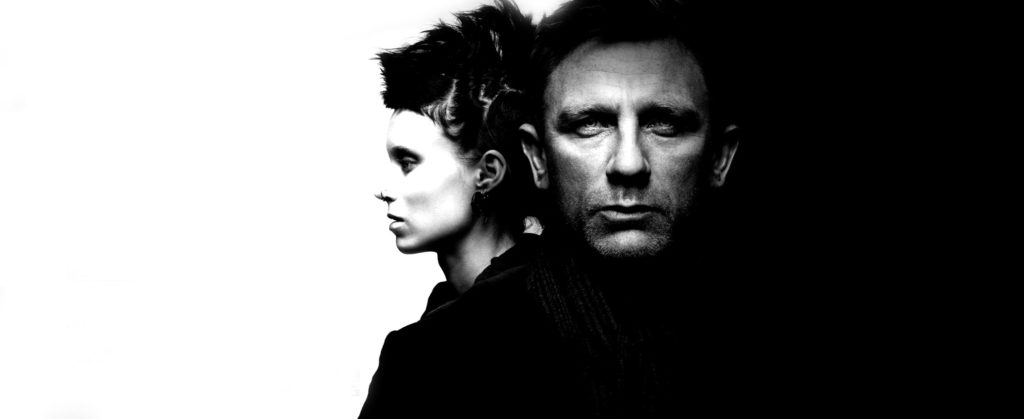The Girl with the Dragon Tattoo (2011)

Daniel Craig stars as investigative journalist Mikael Blomkvist, who ends up losing a major and very public libel lawsuit, not because he wasn’t right, but because he lacked the evidence to prevail. His reputation now a disgrace and suffering faltering finances, Blomkvist leaves the magazine he helped build up and takes on a job investigating the 40-year-old murder of a young girl, Harriet, niece to elderly and well-off industrialist Henrik Vanger (Plummer), who is convinced that only a member of the Vanger family could have committed the heinous deed. Blomkvist soon finds himself the reluctant partner in solving crime with Lisbeth Salander (Mara), a punk computer hacker who is antisocial, maladjusted, and smart as a whip — and that’s after she is hired to get the goods on Blomkvist. As the odd couple begins to put the pieces of the puzzle together they discover there’s much more to the story than meets the eye, as the solution involves the solving of many other unsolved murders over the last couple of decades.
Director David Fincher and screenwriter Steven Zaillian remake (some might say needlessly) the Swedish adaptation of Stieg Larsson’s wildly popular book of the same name to nearly identical results, though the lack of subtitles, recognizable actors, and higher production values may make it the version of choice for international audiences. Given that the book had first been published in English in 2008, a film followed and released worldwide in 2009, this 2011 film may leave the story too fresh in the minds of many fans to get as involved in the story as first-timers, so the pressure is definitely on to deliver something more, or at least different. And at over 2.5 hours, there is always the possibility of making moviegoers restless without something to keep them fixed with rapt attention.
One of the more interesting choices regarding the film is that the makers have decided to keep the Scandinavian setting, rather than change the names and relocate the film to the United States or England, a decision that does keep intact the book’s underlying political background regarding Nazis and past sins of state and the rich and powerful who ruled the roost. For English-speaking audiences, this makes for a slightly distancing feel, as everyone is speaking English, while newspaper and magazine headlines are in their original Swedish. Also interesting is that most of the dialogue is done with the actors using their native tongue (British or American, mostly) in terms of accent (Rooney Mara is a notable exception), rather than try fake Swedish inflections, which does feel more natural to the characters and the way they interplay.
The opening credits kick things off with a bang, with an artistic and nightmarish CGI-infused display shot to the sounds of a cover of Led Zeppelin’s “Immigrant Song”, performed by NiN’s Trent Reznor and Yeah Yeah Yeah’s Karen O, all of which foreshadows the deep and dark events to come. Gorgeous, icy locale work gives the cold, chilly tone to the dark and desolate story, and there is no question that Fincher’s penchant for sick and twisted modern thrillers is almost without rival. Zaillian presents an intelligent and thought-provoking adaptation, though a good deal of the Nazi backstory is toned down and more psychological rationale is given to the motives of the person(s) of mystery. This is perhaps due to the disconnect that the creators of this film have with Sweden and its society, whereas it had been firmly entrenched in the Larsson novels, and kept largely in the Swedish first cinematic take. Zaillian also fleshes out the prior relationships of the hero and antihero, grounding them into a sense of reality before they begin to experience some of the film’s more harrowing trials and tribulations, while also putting forth tension between the two when they become closer to each other later in the story.
The players are fine, though most fans of Larsson’s series will recognize that the only truly important performance to sell the film is that of the fierce, feisty and deeply troubled Salander, who was captured brilliantly, perhaps quintessentially, by Noomi Rapace in the Swedish version. The stakes were high for relative newcomer Rooney Mara, and, thankfully, she is up to the task, though with more vulnerability than Rapace, and less ferocity. Having seen both versions, I prefer the original take, as Mara comes across a touch more like Edward Scissorhands in her approach than standing on the borderline between genius and insanity that is the mark of Salander in the novels.
The story has some twists and turns, and though it is entertaining, it’s never quite as good or as gripping as, say, Silence of the Lambs, though both are cut from similar cloth. The film, much like the book, keeps mostly at a distance to the audience, as we are witness to the events that transpire for the characters without ever truly reeling us into their mortal plight. The details seem much more important than the bigger picture, and it isn’t always inclusive. As such, it is a cerebral thriller, intelligent and rich in concepts, and yet not nearly what one would call a thrill-ride nail biter. But it is, nevertheless, consummately watchable, despite occasional lulls, and should be seen as another fine entry in the serial killer thriller genre for Fincher.
Qwipster’s rating: A-
MPAA rated R for brutal violent content including rape and torture, strong sexuality, graphic nudity, and language
Running time: 158 min.
Cast: Daniel Craig, Rooney Mara, Christopher Plummer, Stellan Skarsgard, Steven Berkoff, Robin Wright, Yorick van Wageningen, Joely Richardson, Geraldine James, Goran Visnjic, Donald Sumpter, Julian Sands
Director: David Fincher
Screenplay: Steven Zaillian (based on the novel by Stieg Larsson)
